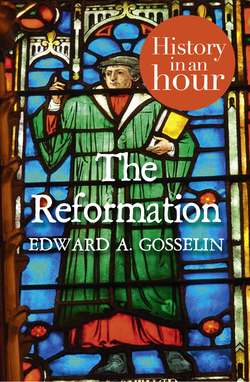Читать книгу The Reformation: History in an Hour - Edward Gosselin A - Страница 8
ОглавлениеThe Sacraments, Heaven and Hell
Ensuring your salvation for an eternity in Heaven so as to avoid eternity in Hell was as important to a believer in the sixteenth century (whether king or commoner) as getting a good crop or transporting your wool to market. According to the Roman Catholic Church, there could be no entrance into Heaven without the Church and its exclusive sacraments which conferred what is known as sanctifying grace.
Take, for example, King Henry IV of France who on 14 May 1610 was stopped in his carriage on a street in Paris, and stabbed in the chest by an assassin. His companions, although sure he was already dead, covered his wounds as he was rushed back to the palace. Laid out on his bed, a priest put his ear to the king’s mouth in order to hear a possible last confession but no sound came from the dead monarch’s mouth. The sacrament of Last Rites could not be performed and it was thus possible, although the Church would never pronounce on the issue, that King Henry never made it to heaven.
By the mid-twelfth century, seven sacraments (the outward acts which give inward, divine grace) had been defined canonically, of which five were for the laity and religious alike. All Roman Catholics were baptized soon after birth, removing the Original Sin (which Adam and Eve had committed after their unfortunate encounter with Satan in the Garden of Eden). They could all receive the sacrament of confession from a priest by which their souls were cleansed of sins committed since baptism. All Catholics could then receive communion (the Eucharist or Lord’s Supper – a replication of Christ’s Last Supper with His Apostles before His crucifixion) from a priest who changed the bread and wine at the celebration of Mass into what was (and is still) believed by Catholics to be: the real Body and Blood of Jesus. They were given the sacrament of confirmation in their teenage years to become adults in and defenders of the Catholic faith. Finally, all Christians could have their souls given a final cleansing, Eucharist, and a last anointing from a priest before death through the sacrament of Extreme Unction.
One of the final two sacraments was for the laity (Marriage) and the other (Holy Orders) for those becoming priests who were then capable of performing the sacrement of Eucharist – changing bread and wine into the real Body and Blood of Jesus for Eucharistic communion. After AD 1139, the Church decreed that priests could not marry, thereby circumventing inheritance disputes within the Church and its properties.
